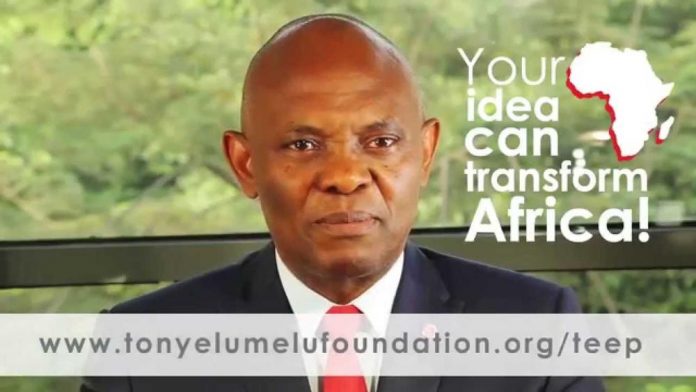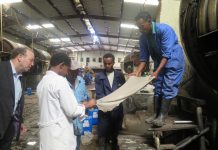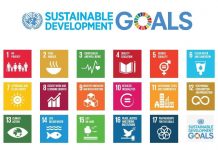There are tens of millions of people across this continent, yearning for some of the things that we take for granted. They want jobs. They want to send their children to school. Perhaps they want to own a home, or a car. For some, even just owning a bicycle may feel like a taste of freedom and independence. They want — and they should be able to afford — healthcare, food, recreation, and the basic comforts of life.
In short, Africans, like people the world over, yearn for self-determination, and the economic resources to make that possible. This is what I define as “development.”
For decades, charity has been front and center in Africa’s development agenda—playing a prominent, if not a dominant role. And charity will always have a role to play in some aspects of healthcare, or education, or disaster relief. Even in the West we saw a critical need for charity relief when the U.S. was hit by Superstorm Sandy.
But experience is teaching us that, over the long term, chronic health and welfare issues are better addressed by creating self-reliant individuals, families and communities. People and communities that have jobs and economic resources are better equipped to solve their own problems—to their own satisfaction—than charities that offer temporary relief.
The philanthropic community, however, is only just beginning to take this lesson to heart. Most philanthropies still focus primarily on giving away “free money.” The world’s oldest, largest and most generous charitable institutions—like the Ford Foundation, the Carnegie Foundation, the Gates Foundation, and many others over many decades—have historically focused on grant-making and charitable support for public services, because in the 20th century worldview, addressing any problem merely required sufficient giving.
But in fact, in his book, Random Reminiscences of Men and Events, John D. Rockefeller wrote that the goal of charity is essentially to beget more charity. He says: “It is easy to do harm in giving money. [Giving] to institutions which should be supported by others is not the best philanthropy.”
A powerful statement indeed, from one of the world’s best known philanthropists. In this worldview, it was accepted as an immutable fact that recipients of charity would need to “make constant appeals,” meaning that they would forever remain in constant need. There is no talk here of outgrowing the need for appeals, or solving the underlying problems.
Back in 2010, after spending $700 million on polio vaccines and prevention programs, the Gates Foundation found that polio was actually spreading in many parts of the developing world. An article in The Wall Street Journal pointed out that polio had “evaded a two-decade-long $8.2 billion effort to kill it off.” And the article asked whether humanity is better served by charities waging war on a single disease, or pursing broader goals like improved hygiene and clean water.
Since then, the Gates Foundation has reported progress on its polio goals, but let us step back and ask: Was this how polio was eradicated in the developed world? Through charity? Or was it, rather, because the average working person could afford to go to the doctor? Or because doctors in private practice were part of the fabric of every community?
Perhaps it was because private physicians in the community were an efficient way to get vaccines to the public. Was it helped along by the fact that developed countries had functioning health insurance markets—and had profitable pharmaceutical industries to manufacture vaccines?
The reason why social and welfare problems have been successfully addressed in developed nations is, in large part, because their economic ecosystems are working, whereas here in Africa they aren’t… at least not quite yet. And so, today, we come to a critical crossroads in the evolution of philanthropy. Achieving self-sufficiency for recipients must be the overriding criteria for philanthropic gifts, and success should be measured by how many recipients no longer need charity, rather than how much money is given away.
Essentially, we need a “new type of philanthropy,” one that can get the economic ecosystem working, resolving the underlying factors that contribute to the end goal of development.
We need a new philanthropy that understands the power of private sector solutions.
I believe, the most productive use of charity in this new world will be to support the growth of the private sector, with a goal of eliminating—as much as possible—the need for “free money.”
And this is where “Africa’s wealthy,” the ones who are at the forefront of growth in the private sector, are needed.
Consider the case of United Bank for Africa, which was started with a 5-million-dollar investment, partially funded with “development capital.” UBA is now a multinational, pan-African financial institution that has created 20,000 jobs, generated wealth in communities all across Africa, expanded finance for trade, created stronger financial infrastructure for investment and economic growth, paid taxes to national and local governments to support public services – and given millions of customers control over their financial lives.
The annual flow of charitable aid into Africa is many times the 5-million-dollar investment that started UBA. But has that aid created an equivalent impact? In jobs? In wealth? In sustainable growth? Is that an uncomfortable comparison?
Take water. Charity can pay for a new well, but if no one has a personal interest in it, or responsibility for maintaining it, soon it will fall into disrepair and disuse. On the other hand, structuring that same donation as a for-profit micro-utility creates incentives and resources to maintain it—improving its sustainability and long-term impact.
In fact, “free money” often crowds out vital private sector solutions. Private enterprise cannot compete with highly subsidized capital, and the net result is that charity often provides a short-term fix at the expense of a long-term solution.
This may be an unsettling idea to those of us who believe strongly in philanthropy, but it is a fact nonetheless. Philanthropy and development aid can, and should, be components of Africa’s growth strategy. But I believe it is time for a philosophical change in how that capital is deployed. If our mission is African development, or to be more precise, self-sustaining African development, then “philanthropy” and “charity” need a new way forward.
I find it inspiring that many foundations are now leading the charge in innovative new areas such as impact investing. They are partnering with private capital to focus on sustainable profit-making businesses that generate jobs, economic growth, and social wealth. Many have embraced the idea of “complementary philanthropy” that helps attract global capital and bring impact investing up to scale—a scale that can bring meaningful progress on pressing social challenges.
This is the kind of modern “New Philanthropy” that gets results. It is an approach that we practice at The Tony Elumelu Foundation, in initiatives like our Impact Economy Innovations Fund, launched in conjunction with the Rockefeller Foundation. This principle also guides much of our work at the investment company, Heirs Holdings.
Which brings us back to the topic of investors. Where do we fit with respect to this “New Philanthropy?”…I believe that, just as Africa needs a “new philanthropy,” so it needs a new approach to investment.
I have called this new approach Africapitalism. It asserts that the private sector is best suited to solving Africa’s most pressing problems, through investment, employment, wealth creation, and economic growth. But if the private sector is to accomplish this goal, we must fundamentally re-think our priorities and objectives.
We must do away with short-term thinking. We should be investing over time horizons measured in decades, rather than fiscal quarters. We must stop the practice of extracting wealth without reinvesting for growth. We should be strategically building domestic industries and manufacturing to support healthy vibrant national economies, and growing intra-African trade.
African investors, in particular, must step up. We need to deliberately plow resources back into our own communities to create industries and jobs, to create self-sufficient consumers and businesses, for these will be our future customers, managers, staff, and partners.
I ask: Who will invest here if we are sending all our money to Swiss banks? Who will take investment risks here if we say with our actions that the risk is not worth it?
Heirs Holdings' recent 300 million dollar investment in a power plant in Nigeria to generate 1200 megawatts of electricity is an example of a long-term investment that can bring development to Africa. Through this investment, we intend to create value for our partners and ensure the benefits of having access to electricity are felt by everyone.
Heirs Holdings is investing in a long-term power project in Nigeria because we believe it is worth it. Knowing that children are able to do their homework at night is worth it, that schools are able to run computers, families are able to store food, doctors are able to keep active vaccines in a refrigerator, that entrepreneurs can run their businesses with lower overheads, produce more at lower prices, can innovate, employ, grow — these are all worth it.
I know investing in Africa is worth it because I have seen it with my own eyes. I have experienced it for myself in the countless people I have met, and dozens of business ventures I have pursued.
And I am not alone. People like Aliko Dangote and Mike Adenuga in Nigeria, Lucien Ebata in the DRC, Reginald Mengi in Tanzania, Gordon Wavamuno in Uganda, Patrice Motsepe in South Africa, Kofi Amoabeng in Ghana, are reinvesting in domestic industries that support the basic needs of African people. They are creating tens of thousands of jobs, impacting individuals, families and entire communities.
Where are Africa’s wealthy? That’s where they are. They have been in Tanzania, Uganda, South Africa, Ghana. They have been creating jobs, impacting individuals, families and entire communities.
Economic prosperity is the most valuable and lasting gift we can give to Africa. That should be the ultimate goal of any “development” mission.
Tony O. Elumelu, Nigerian economist, banker, investor and philanthropist, is the chairman of Heirs Holdings Ltd. and founder of The Tony Elumelu Foundation. The above is excerpted from his speech at the African Development Bank's Annual Meeting in Morocco in May.













